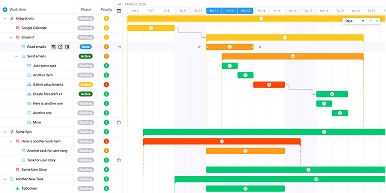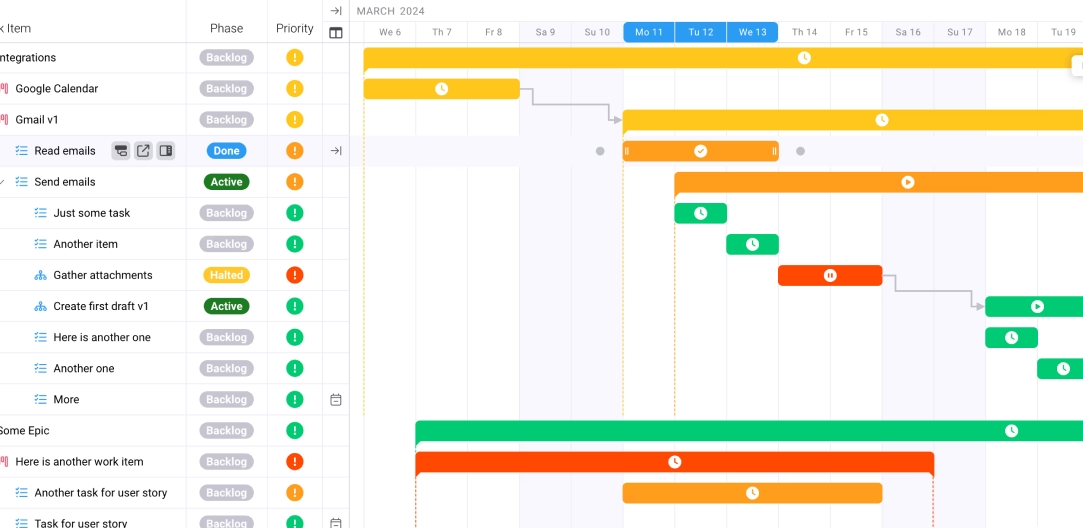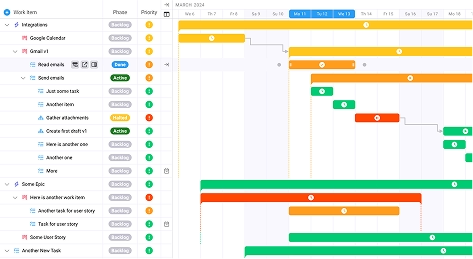
Why Project Management Is Essential for Modern Marketing Teams: Benefits, Tools & Strategies
Key takeaways:
In today’s fast-paced digital landscape, marketing teams face unprecedented complexity and pressure to deliver results across multiple channels, campaigns, and initiatives simultaneously. The reality is that project management is essential for modern marketing teams to navigate this complexity successfully, ensuring campaigns are delivered on time, within budget, and with maximum impact. With 58% of organizations fully understanding the value of implementing project management for better performance [1], it’s clear that structured approaches to managing marketing initiatives have become a business imperative rather than a nice-to-have luxury.
The marketing landscape has evolved dramatically over the past decade. Teams now manage everything from social media campaigns and content marketing to email automation, influencer partnerships, and complex multi-channel campaigns. Without proper project management frameworks, these initiatives often suffer from missed deadlines, budget overruns, unclear responsibilities, and poor communication – issues that can significantly impact brand reputation and revenue growth.
The Current State of Marketing Project Management
Marketing teams today operate in an environment where agility and precision are paramount. A Gartner survey found that 84% of marketers experience frustration and inefficiency from excessive meetings, redundant feedback loops, and unclear roles [5], highlighting the collaborative challenges that plague modern marketing organizations. This collaboration drag not only impacts team morale but also directly affects campaign performance and time-to-market for critical initiatives.
The statistics paint a compelling picture of the growing importance of structured project management approaches. Organizations that use project management practices have a 92% success rate in meeting project objectives [3], compared to significantly lower success rates for teams that rely on ad-hoc approaches. Furthermore, the global market for project management software alone is estimated to reach $4.7 billion [2], a significant jump from 2020’s total of $3.5 billion, indicating widespread organizational investment in these capabilities.
The shift toward remote and hybrid work arrangements has further amplified the need for robust project management systems. Approximately 37% of U.S. workers were engaging in hybrid or remote work arrangements [6], making digital coordination tools and structured processes essential for maintaining team cohesion and productivity.
Core Benefits of Project Management for Marketing Teams

Enhanced Campaign Coordination and Visibility
Modern marketing campaigns involve multiple stakeholders, from creative designers and copywriters to data analysts and digital advertising specialists. Project management provides the framework necessary to coordinate these diverse skill sets effectively. When teams implement structured project management approaches, they gain real-time visibility into campaign progress, resource allocation, and potential bottlenecks before they become critical issues.
This visibility extends beyond internal team coordination to include external stakeholders such as clients, vendors, and partner organizations. Clear project timelines, deliverable tracking, and communication protocols ensure that all parties remain aligned throughout the campaign lifecycle, reducing the risk of misunderstandings and scope creep that can derail marketing initiatives.
Improved Resource Allocation and Budget Management
Marketing budgets are under constant scrutiny, with executives demanding clear ROI justification for every initiative. Project management provides the structure necessary to track resource utilization, monitor budget consumption, and identify opportunities for optimization. Teams can allocate human resources more effectively, ensuring that high-priority campaigns receive adequate attention while preventing team burnout through balanced workload distribution.
Budget management becomes significantly more precise when campaigns are managed as discrete projects with defined scopes, timelines, and resource requirements. This structured approach enables more accurate budget forecasting and helps teams identify cost-saving opportunities without compromising campaign quality or effectiveness.
Accelerated Time-to-Market
In competitive markets, the ability to launch campaigns quickly can provide significant competitive advantages. Project management methodologies, particularly agile approaches adapted for marketing contexts, enable teams to reduce time-to-market through parallel workstreams, efficient approval processes, and streamlined creative development cycles.
Teams that implement project management best practices often discover opportunities to eliminate redundant processes, automate routine tasks, and optimize creative review cycles. These improvements compound over time, enabling organizations to increase campaign frequency and responsiveness to market opportunities.
Risk Mitigation and Quality Assurance
Marketing campaigns involve numerous potential failure points, from creative approval delays to technical implementation challenges and compliance issues. Project management frameworks provide systematic approaches to risk identification, assessment, and mitigation planning. Teams can proactively address potential issues before they impact campaign timelines or quality.
Quality assurance becomes embedded throughout the campaign development process rather than relegated to final review stages. This approach reduces the likelihood of costly revisions and ensures that campaigns meet brand standards and regulatory requirements before launch.
Essential Project Management Tools for Marketing Teams
Collaboration and Communication Platforms
The foundation of effective marketing project management lies in robust communication and collaboration tools. Fifty-one percent of surveyed individuals want to communicate with internal stakeholders via chat apps, like Slack and Microsoft Teams, rather than email [7], indicating a clear preference for real-time communication platforms that support rapid decision-making and problem-solving.
Modern collaboration platforms integrate seamlessly with project management tools, creating unified workspaces where team members can access project information, share feedback, and coordinate activities without switching between multiple applications. The global collaboration software market revenue reached $6.56 billion in 2023 [8], while the team collaboration software market size was valued at USD 36,114.2 million in 2024 [9], demonstrating the significant investment organizations are making in these integrated environments to reduce communication friction and help maintain project momentum.
Visual Project Planning and Tracking Tools
Marketing campaigns benefit significantly from visual project management approaches that make complex timelines and dependencies easily understandable. Gantt charts, Kanban boards, and timeline views help teams visualize campaign workflows, identify critical path activities, and track progress against milestones. For example, Ravetree makes it easy for users to switch between Gantt, board, timeline, gallery and table views when working on projects.
Visual planning tools are particularly valuable for creative processes where iterative development and approval cycles can create complex scheduling challenges. Teams can easily identify bottlenecks, redistribute workloads, and communicate status updates to stakeholders through intuitive visual interfaces.

Resource Management and Capacity Planning Solutions
Marketing teams must balance multiple concurrent campaigns while ensuring that individual team members aren’t overloaded. Resource management tools provide visibility into team capacity, skill availability, and workload distribution across projects. These insights enable more intelligent project scheduling and resource allocation decisions.
Advanced resource management capabilities include forecasting features that help teams anticipate capacity constraints and plan accordingly. This proactive approach prevents last-minute resource scrambles and helps maintain consistent campaign quality across all initiatives.
Analytics and Performance Tracking Systems
Project success measurement requires robust analytics capabilities that extend beyond basic task completion tracking. Marketing project management tools should integrate with campaign performance measurement systems, enabling teams to correlate project execution metrics with campaign outcomes.
These integrated analytics provide insights into process efficiency, resource utilization effectiveness, and the relationship between project management practices and campaign performance. Teams can use these insights to continuously refine their project management approaches and optimize future campaign execution.
Strategic Implementation Approaches
Agile Marketing Methodologies
Traditional project management approaches often prove too rigid for the dynamic nature of marketing campaigns. Agile methodologies, adapted specifically for marketing contexts, provide the flexibility necessary to respond to changing market conditions, stakeholder feedback, and performance data while maintaining project structure and accountability.
Agile marketing approaches emphasize iterative development, frequent stakeholder communication, and data-driven decision-making. Teams organize work into short sprints, enabling rapid experimentation and course correction based on early performance indicators. This approach is particularly valuable for digital marketing campaigns where performance data becomes available quickly and can inform optimization decisions.
Cross-Functional Integration Strategies
Modern marketing campaigns require coordination across multiple organizational functions, including sales, product development, customer service, and executive leadership. Effective project management strategies must account for these cross-functional dependencies and provide mechanisms for seamless collaboration across organizational boundaries.
Integration strategies include establishing clear communication protocols, defining roles and responsibilities across functions, and implementing shared tools and processes that support cross-functional visibility and coordination. These approaches help prevent organizational silos from undermining campaign effectiveness.
Scalable Process Development
Marketing organizations must develop project management processes that scale effectively as teams grow and campaign complexity increases. Scalable processes balance standardization with flexibility, providing consistent frameworks that can accommodate diverse campaign types and team structures.
Successful scaling requires careful attention to process documentation, training programs, and change management strategies. Organizations must invest in developing internal project management capabilities while maintaining the agility necessary to adapt processes based on evolving business needs and market conditions.
Technology Integration and Automation
AI in project management is projected to grow from $3.08 billion in 2024 to $3.58 billion in 2025, with a CAGR of 16.3% [4], indicating significant opportunities for marketing teams to leverage advanced technologies for process optimization. Automation capabilities include routine task management, approval workflow orchestration, and performance reporting generation.
Advanced integration strategies connect project management tools with marketing technology stacks, creating seamless data flow between campaign planning, execution, and measurement systems. These integrations eliminate manual data entry, reduce error rates, and provide comprehensive visibility into campaign performance across all channels and touchpoints.
Building a Project Management Culture
Leadership Commitment and Support
Successful project management implementation requires strong leadership commitment and visible support for new processes and tools. Leaders must model project management behaviors, provide necessary resources for implementation, and consistently reinforce the importance of structured approaches to campaign management.
Leadership support includes investing in training programs, providing adequate tool budgets, and adjusting performance metrics to reflect project management objectives. Without this foundation, implementation efforts often struggle to gain traction and achieve sustainable results.
Training and Skill Development Programs
Marketing professionals often require specific training to effectively apply project management principles in creative and campaign contexts. Training programs should address both technical tool usage and fundamental project management concepts, with emphasis on practical application in marketing scenarios.
Effective training programs combine formal instruction with hands-on application opportunities, enabling team members to develop confidence and competence with new processes and tools. Ongoing skill development ensures that capabilities evolve with changing technology and business requirements.
Change Management and Adoption Strategies
Implementing new project management approaches requires careful change management to address potential resistance and ensure smooth adoption. Change management strategies should include clear communication about benefits, involvement of team members in process design, and gradual implementation approaches that minimize disruption to ongoing campaigns.
Successful adoption often requires identifying and leveraging project management champions within marketing teams who can provide peer support and serve as advocates for new approaches. These internal champions play crucial roles in addressing concerns and demonstrating practical benefits through their own successful implementations.
Measuring Success and Continuous Improvement
Key Performance Indicators for Marketing Project Management
Effective measurement requires establishing clear KPIs that reflect both project execution success and campaign outcome achievement. Research shows that 37% of projects fail due to lack of defined project objectives [17], while 85% of project managers tend to run multiple projects at the same time [18], highlighting the critical importance of clear measurement frameworks. Project-focused metrics include on-time delivery rates, budget adherence, resource utilization efficiency, and stakeholder satisfaction scores. Campaign-focused metrics connect project management practices to business outcomes such as lead generation, brand awareness, and revenue attribution.
Comprehensive measurement frameworks track leading indicators that provide early warning of potential issues alongside lagging indicators that measure ultimate success. This balanced approach enables proactive management while maintaining focus on business results.
Continuous Process Optimization
Project management implementation should be viewed as an iterative process requiring ongoing refinement based on experience and changing business needs. Regular retrospectives and process reviews help teams identify improvement opportunities and adapt approaches based on lessons learned from completed campaigns.
Optimization efforts should balance standardization needs with flexibility requirements, ensuring that processes support efficiency without constraining creativity or responsiveness. This balance is particularly important in marketing contexts where campaign requirements can vary significantly based on audience, channel, and objectives.
Technology Evolution and Adaptation
The project management technology landscape continues to evolve rapidly, with new capabilities and integration opportunities emerging regularly. Marketing teams must stay informed about technology developments and evaluate how new tools and features can enhance their project management effectiveness.
Technology adaptation strategies should include regular tool assessments, pilot programs for promising new solutions, and systematic approaches to technology migration when benefits justify the effort. These strategies ensure that teams can leverage technological advances while maintaining operational stability.
Future Trends and Considerations
Artificial Intelligence and Automation Integration
The integration of AI and automation technologies into project management workflows represents a significant opportunity for marketing teams to enhance efficiency and effectiveness. By 2029, the AI in project management market is expected to reach $7.4 billion with a CAGR of 19.9% [4], indicating substantial investment and innovation in this area.
AI applications in marketing project management include predictive analytics for timeline and resource planning, automated task assignment based on team member skills and availability, and intelligent content review and approval processes. These capabilities can significantly reduce administrative overhead while improving decision-making quality.
Remote and Hybrid Team Management
The continued prevalence of remote and hybrid work arrangements requires project management approaches specifically designed for distributed teams. These approaches must address challenges related to time zone coordination, asynchronous communication, and maintaining team cohesion across physical distances.
Successful remote project management strategies emphasize clear communication protocols, shared documentation standards, and tools that support effective collaboration regardless of physical location. These capabilities become increasingly important as organizations access global talent pools and adapt to flexible work preferences.
Data-Driven Decision Making Evolution
Marketing project management is becoming increasingly data-driven, with teams leveraging analytics to optimize processes, predict outcomes, and make more informed resource allocation decisions. This evolution requires project management tools that integrate seamlessly with marketing analytics platforms and provide actionable insights for continuous improvement.
Advanced analytics applications include predictive modeling for campaign performance, resource optimization algorithms, and automated reporting systems that provide real-time visibility into project health and campaign effectiveness.
Industry-Specific Implementation Considerations
B2B Marketing Project Management
B2B marketing campaigns often involve longer sales cycles, more complex stakeholder groups, and higher-value transactions that require specialized project management approaches. Marketing success hinges on well-defined goals and a clear roadmap [21], particularly in B2B environments where these campaigns frequently require coordination between marketing, sales, and customer success teams throughout extended nurturing processes.
B2B-specific considerations include account-based marketing coordination, sales enablement material development, and complex approval processes involving multiple decision-makers. Strategic Project Management Office best practices [23] emphasize the importance of frameworks that must accommodate these complexities while maintaining campaign momentum and stakeholder engagement.
E-commerce and Retail Marketing
E-commerce and retail marketing environments require project management approaches that can respond quickly to market changes, seasonal fluctuations, and inventory considerations. Marketing research is critical to business success [24], particularly in environments that often involve high-frequency campaign launches and rapid optimization cycles based on performance data.
Retail-specific considerations include promotional calendar management, inventory coordination, and omnichannel campaign synchronization across online and offline touchpoints. Project management tools and processes must support the rapid pace and complexity of retail marketing operations.
Agency and Client Service Management
Marketing agencies face unique project management challenges related to multiple client relationships, diverse campaign requirements, and resource sharing across accounts. Project managers have a key responsibility for project marketing [22], particularly in agency environments where they must balance client-specific needs with operational efficiency and profitability considerations.
Agency-specific considerations include client communication protocols, resource allocation across multiple accounts, and billing and time tracking integration with project management systems. These requirements often necessitate specialized tools and processes designed specifically for agency environments.
Conclusion
The evidence is overwhelming that project management is essential for modern marketing teams seeking to thrive in today’s complex, fast-paced business environment. Organizations that embrace structured project management approaches achieve higher success rates, better resource utilization, and improved campaign outcomes compared to teams that rely on ad-hoc coordination methods.
The benefits extend far beyond simple task organization to encompass strategic advantages including accelerated time-to-market, enhanced cross-functional collaboration, and data-driven process optimization. As marketing campaigns become increasingly complex and stakeholder expectations continue to rise, the organizations that invest in robust project management capabilities will be best positioned to succeed.
The technology landscape supporting marketing project management continues to evolve rapidly, with the project management software market expected to grow at a CAGR of 10.67% [20], and 55% of organizations still lacking project management offices [19], creating significant opportunities for competitive advantage through proper implementation. AI-powered automation, advanced analytics, and seamless integration capabilities are creating new opportunities for efficiency and effectiveness. Teams that stay current with these developments while maintaining focus on fundamental project management principles will maximize their competitive advantages.
Implementation success requires commitment to change management, investment in training and tools, and leadership support for new processes and approaches. While the transition may require initial effort and resources, the long-term benefits of structured project management far outweigh the implementation costs.
Looking ahead, the most successful marketing organizations will be those that recognize project management not as an administrative burden but as a strategic capability that enables creativity, agility, and measurable business impact. The question is no longer whether project management is essential for modern marketing teams – it’s how quickly organizations can implement these capabilities to capture the competitive advantages they provide.
References
- Project Management Statistics: Trends and Common Mistakes in 2024
- Important Project Management Statistics for 2025 and beyond
- 55 Project Management Statistics of 2024
- 110+ project management statistics and trends for 2025
- Workplace collaboration statistics 2025
- Team Collaboration Software Market Set to Reach USD 62.4 Billion by 2032
- 15 Team Collaboration Statistics
- Collaboration Software Statistics 2025 By Workplace, Workers, Technology
- Team Collaboration Software Market Trends
- Best Practices for Managing Marketing Projects
- Why Is Project Management Important?
- Project Management for Marketing
- Marketing Statistics Every Team Needs to Grow in 2025
- 32 statistics about collaboration in the workplace in 2024
- Collaboration Software Market Size
- Team Collaboration Software Market Set to Reach USD 62.4 Billion by 2032
- 100+ Project Management Statistics & Facts (Updated 2025)
- 55 Project Management Statistics of 2024
- 100+ Project Management Statistics & Facts (Updated 2025)
- 95 Essential Project Management Statistics: 2024 Market Share & Data Analysis
- Best Practices for Managing Marketing Projects
- Milieu as a Pertinent Unit of Analysis in Project Marketing
- Project Management Best Practices
- How To Conduct Marketing Research That Improves Business Outcomes
- 100+ Project Management Statistics & Facts (Updated 2025)









